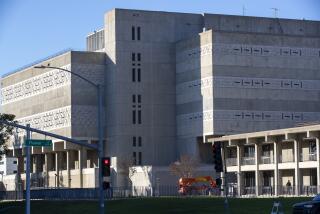Let Plea Bargaining Be Public
- Share via
Orange County Dist. Atty. Cecil Hicks has shaken up some judges and defense attorneys with a directive to his prosecutors to move plea bargaining out of the privacy of the judge’s chambers into the open courtroom where the public can see what is happening.
Some judges and defense attorneys don’t like the idea. They fear that Hicks’ policy will discourage plea bargaining and thus overload the system with a backlog of criminal cases going to trial instead of being settled. They would rather deal in chambers.
We like the Hicks approach.
It’s probably true that the criminal justice system couldn’t function, certainly not as efficiently, without some form of plea bargaining. We don’t think that approach can be eliminated entirely, and don’t think that Hicks does either.
Even Proposition 8, which was passed by voters in 1982 to prohibit plea bargaining in a wide range of felony cases, listed some exceptions. So did a memo issued by Hicks in 1981, similar to the current edict, calling for case discussions to be on the record. And neither action brought on the dreaded backlog of cases to cripple the court system.
Negotiating pleas provides a way to impose punishment (most often a state prison or county jail sentence) without the expense of lengthy trials that clog up the court calendar and delay the resolution of civil cases.
Judges now routinely issue “indicated sentences” that show how they would rule and what sentence they would impose according to the facts presented. There’s no reason why many, if not most of them, can’t be determined in open court instead of behind closed doors. Having an efficient court system is important. But even more important is having one that strives to do the public’s business in public.
More to Read
Sign up for Essential California
The most important California stories and recommendations in your inbox every morning.
You may occasionally receive promotional content from the Los Angeles Times.













